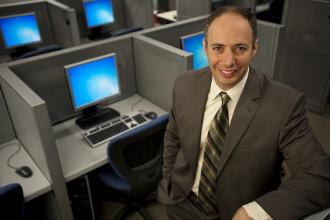The science behind consumer psychology
On a recent Friday morning, about a dozen undergraduate students gathered in a computer lab in the business school where they were directed to a website and asked to make various choices—everything from what to order for dessert to whether to go to a restaurant advertising a special to which NFL replica jersey to buy.

It may sound like an online shopping session, but in fact the students were participating in behavioral experiments designed to help researchers at the Freeman School better understand the complexities of consumer decision-making processes.
The Freeman School’s Behavioral Lab hosts dozens of such experiments each semester. Located on the first floor of Goldring/Woldenberg Hall, the lab features 24 specially configured computer terminals that enable business school faculty to administer surveys, conduct experiments and collect the kind behavioral research data that eventually ends up in peer-reviewed journals. In a very real sense, the Behavioral Lab is where the science of consumer psychology begins.
“This lab is very similar to what you have in psychology departments in the sense that there are professors who do behavioral experimentation,” says Eric Hamerman, assistant professor of marketing, who administers the lab for the Freeman School’s marketing faculty.
Recent topics investigated in the lab include social media and its effect on purchase behavior, the effect of mood on consumer variety-seeking, alliteration in advertising, multitasking and purchase behavior, and the impact of the moral behavior of celebrities on product endorsements.
More than 300 students in TIDES and core marketing courses participate in studies each semester in exchange for class credit. While students may not be right for every study, Hamerman says they’re generally ideal for consumer behavior research.
“Are Tulane students representative of everybody in the country? Probably not. But are they consumers? Absolutely. If you’re studying human behavior and making choices, they’re a fine population.”
Interested in advancing your education and/or career? Learn more about Freeman’s wide range of graduate and undergraduate programs. Find the right program for you.
Other Related Articles
- Harvard Business Review: Why AI Boosts Creativity for Some Employees but Not Others
- Forbes: How To Talk Politics With Family Over The Holiday
- AI-powered fund takes top prize in Aaron Selber Jr. Hedge Fund Course
- De Franco appointed Keehn Berry Chair of Banking and Finance
- The Wall Street Journal: For Trump, the Warner Megadeal Talks Are All About CNN
- Research Notes: Matthew Higgins
- New Goldring Institute director hopes to expand international partnerships
- New study shows how personal profiles transform social media customer service
